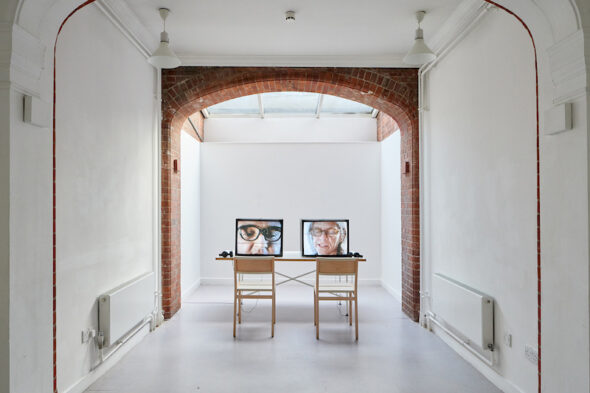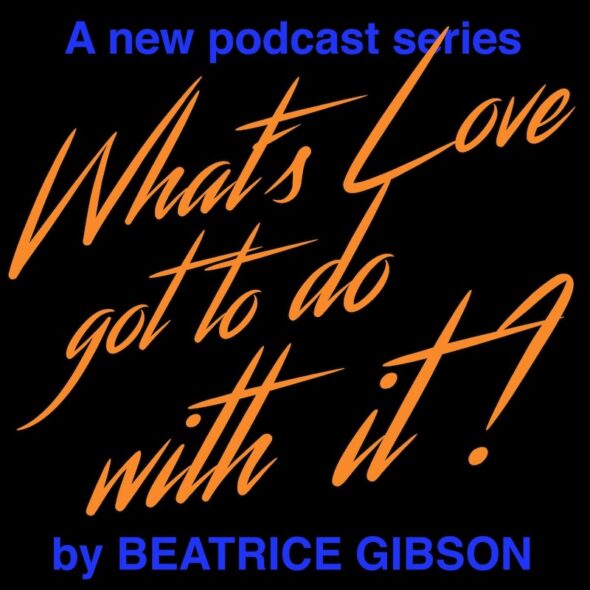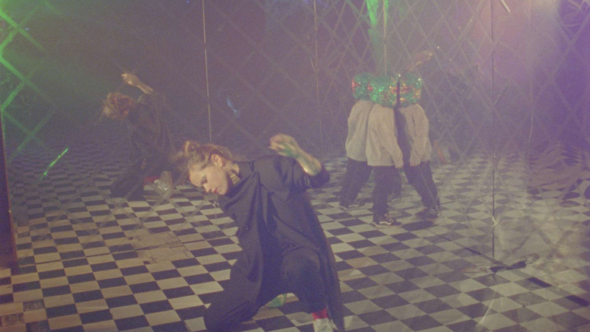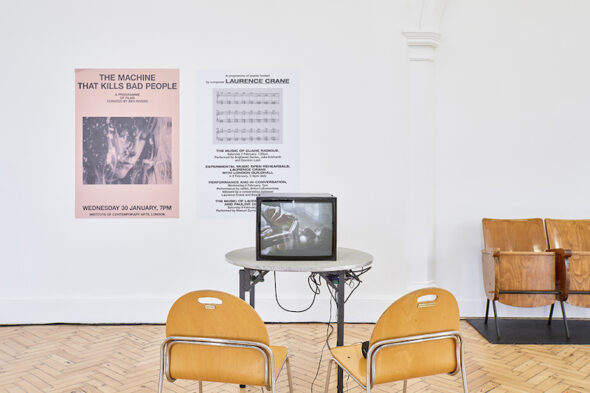by Nora Kovacs // Oct. 23, 2020
Beatrice Gibson’s work is imbued with a tenderness that is difficult to come by these days. Amidst the chaos, violence and impending doom that seems to characterize the present moment, the London-based artist brings feeling to the fore, enveloping audiences in a cadence that would otherwise only be experienced in our closest and most intimate encounters. For the three-part podcast series ‘What’s Love Got To Do With It?’—co-commissioned by Mercer Union, Bergen Kunsthall, Camden Art Centre and KW Institute for Contemporary Art—Gibson has turned to six poets to guide her through the tangled territories of love as she prepares for her upcoming film, an epic love story that unfolds over the course of one night. I spoke with Gibson as she was getting ready to pick up her kids from school; as good a time as any to discuss the radical potentialities of finding softer, more gentle ways of being together.

Beatrice Gibson: Crone Music, installation view at Camden Arts Centre, 2019 // Photo: Luke Walker
Nora Kovacs: You describe the premise of ‘What’s Love Got To Do With It?’ as an exploration of the different conceptual ideas of love and, more specifically, the relationship between poetry and radical love. What does “radical love” mean to you? What makes love “radical”?
Beatrice Gibson: The idea of radical love is funny. It sounds unattainable or avant-garde. For me, it’s an understanding of love that I came to later in my life. It’s a type of love that is not shown through a male lens or in the Hollywood way of meeting an individual, falling in love on the spot, and other absurd notions that I think are really destructive. Radical love is more nuanced: it’s a practice, a daily choice. It’s not just, “Oh, I’ve fallen in love with you” but what does love actually mean in relationship to another human being? What is the value system around love? With the podcast, I wanted to initiate a bit of thinking around love by getting other people to tell me what it is. Poets are the ultimate experts in sentiment, so they seemed like the go-to consultants on the subject.
NK: Each poet challenges any preconceived notions of who or what we are supposed to love and be loved by. LeAnne Howe and CAConrad express the urgency with which we must love the planet and our environment, while Sophie Robinson shares her soft, milky experience of being “mothered by the moon” and Ariana Reines describes being “ass-whippingly fathered by the sun”. How do these expanded forms of parenthood and kinship come through in your own work?
BG: I work at home, I pick up my children from school everyday and I’m in this nuclear family that is so great and isolating and navel-gazing and odd. I’m always trying to think of those relationships as a metaphor for a wider political engagement with the world. My interest in motherhood is not just about how I am mothering my own child, but what is my relationship to “other” in this particular instance and how do I take it as a blueprint for my relationship to otherness in general? I’m interested in widening the narrow perspectives that I inhabit, so as not to feel suffocated or enclosed by them. It’s the same thing with love. How do I look at love outside of this personal and intimate space? How do I take the extreme experience of love that I feel in relation to my kids or my dog and cast it out into a broader social and political sphere? Sophie Robinson talks about this so beautifully in terms of the small things that people do for each other: the slow, radical love of taking soup to a friend or showing up in the streets. It comes back to the idea of love as a practice.

Beatrice Gibson: ‘What’s Love Got To Do With It?’, podcast series, cover // Graphic design by HIT Studio
NK: In the final episode of the podcast series, Sophie Robinson and Ariana Reines discuss the notion of “overstaying your welcome”. It is an act that implies the presence of a hospitable encounter but is also laced with resistance and/or discomfort; the turning point at which receiving care becomes a burden. In the slowed-down temporalities that we have been forced to inhabit lately, what are the ways in which we can overstay our welcome? How do these nuanced manifestations of love and resistance play out in your own practice?
BG: I actively use my practice to carve out space for the things in my life that I don’t have time for. I collaborate with friends, colleagues and people that I admire as a way to forge new relationships and deepen existing ones. It’s about making community through work; making life and work coalesce so that you can get the things you need to sustain you. It’s also a way of resisting the overactive pace of capitalism and what capitalism requires you to do. Privileged, white men can get up at 5am to go on studio visits and interview all of the artists and musicians in the world; people can stay late and work until 3am if they don’t have a baby or if they aren’t working two jobs. It creates a hierarchy of who is able to meet you at 5am or to work until 3am. I don’t want to live like that, and I don’t find it to be a critical way of being either. It’s not a mode of attention that is in any way radical; it’s exclusive. Having my practice serve as a space for friendship or thinking about love in the context of my professional life is a way to resist that speedy, over-zealous economy of time. It’s a way of re-thinking the whole process, not just the content, so that different types of people can participate.

Beatrice Gibson: ‘I Hope I’m Loud When I’m Dead,’ 2018, still // Courtesy of the artist
NK: There is a dynamic relationship between poetry and ritual that is present throughout the podcast series, whether it be CAConrad’s meditative approach to writing or Reines describing the ritual of taking a bath as “steeping until the flesh falls off the bone”. Do you consider your artistic practice to be a ritual? Or are there any rituals that have had a similarly tenderizing effect on you and your work?
BG: CAConrad comes from a family of factory workers and their development of a ritual system was a reaction to that. Instead of constantly churning out poetry like a production line, their ritual practice is a slowing down mechanism. Just after working with CAConrad on the film ‘I Hope I’m Loud When I’m Dead’, I made a pact with myself to try to watch one feature film per day. It was through the process of looking at the Criterion Collection and realizing how few films it included by women that I formed the film club ‘The Machine That Kills Bad People’ with Erika Balsom, Maria Palacios Cruz and Ben Rivers at the ICA Cinema in London. I like the way that you think a ritual will have a certain end and then this other thing comes out of left field.
Currently, picking up my kids from school is my ritual. It’s annoying and it interrupts my day, but then I appreciate the pleasure of being with them in the park, of having to sever from the machine. It forces you to be very present tense. I need that anchoring, especially in the current climate, otherwise it’s a whirlwind of panic in the head.

Beatrice Gibson: ‘Crone Music,’ installation view at Camden Arts Centre, 2019 // Photo: Luke Walker
NK: You are currently working on a new film, a love story set over the course of a single night. Could you share more about this work and how it has been evolving over the past few months and throughout the production of the podcast?
BG: The film is based around a Kathy Acker novel and an Alice Notley poem, titled ‘The Descent of Alette’. It follows a similar epic structure of a person going deep into the night, but the night is also their unconscious. It’s a journey into the unknown. The script is related to everything that came out in the podcast, in the sense that it’s not about heterosexual love at all. It moves through encounters with other human beings, women, non-humans, animals. It’s a film about people hearing each other and being heard, telling each other things in the moonlight as the world spins in turmoil. It has these small moments of loving woven throughout. Each scene is like its own loving moment.
This article is part of our monthly topic of ‘Kinship.’ To read more from this topic, click here.



















